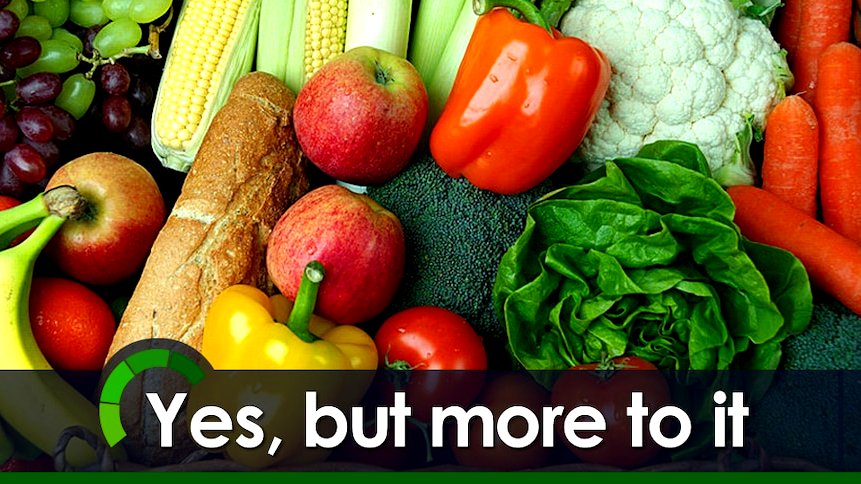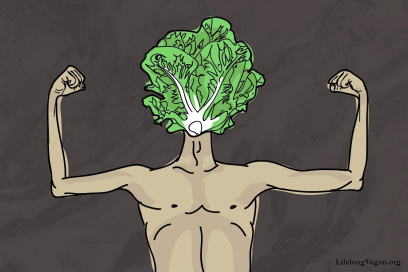Modern society has come to understand the indisputable health advantages associated with adopting a plant-based diet, leading to an unprecedented surge in popularity for veganism. As part of their efforts to justify vegans' rapid adoption, many have put forward the notion that they tend to weigh less than meat eaters - however this claim needs further clarification before becoming accepted fact. In order to test this assertion, we must delve deep into this complex maze. This article seeks to uncover the intricate correlation between veganism and weight loss, which includes all relevant factors. We will explore in this article all of the benefits veganism brings, such as low calorie and fiber-rich food options as well as reduced saturated fat intake. Additionally, our investigation will cover portion control and adopting nutritious snacking habits as key aspects of living a vegan lifestyle. Understanding this relationship between veganism and weight loss is vitally important in making informed decisions regarding healthy living.
I. "Do vegans weigh less?"
Thorough epidemiological research has unearthed an astonishing correlation between veganism and healthiness. Evidence shows that those adhering to veganism may experience lower incidence of cardiovascular illnesses, diabetes type 2, and symptoms related to hypertension. Also noteworthy are vegan diets' ability to provide dense arrays of essential nutrients while simultaneously decreasing caloric density.
Veganism and Weight Loss
Vegans' weight loss could be attributable to their increased consumption of foods rich in fiber and with moderate caloric density - such as fruits, vegetables, legumes, and whole grains. These plant-based edibles provide essential nutrition while remaining satisfying at meal times.
While mainstream diets often consist of processed and high-fructose foods, plant-based fare tends to avoid these exogenous sources as these tend to contribute to obesity and other metabolic dysfunctions.
The Nutritional Advantages of Veganism
Veganism offers numerous nutritional advantages over animal-based diets, from essential and surplus nutrients, minerals and fiber found in more whole food sources to larger portions while still taking in relatively fewer calories - offering an effective path toward weight control and maintaining good health.
Multiple research investigations also confirm the positive influence of vegan diets on body mass index (BMI), calculated by dividing weight by height squared, as an indicator of fat accumulation. One such research investigation demonstrated that overweight ladies following a vegan diet for 14 weeks experienced an average four-pound loss while subjects on this same regimen experienced an overall decrease of 1.2 BMI points relative to controls groups.
The Benefits of Veganism for Weight Loss Efforts
Thus, vegan diets offer many potential advantages in weight loss efforts, with its abundance of essential vitamins and fiber combined with lower levels of unhealthy fats being key factors. Such benefits can lead to improved dietary behavior, weight modulation and overall healthier physiology - making a vegan diet a worthy consideration when looking to shed excess pounds.
Recommendations for a Balanced Vegan Diet
In order to reap its rewards fully, it is recommended to ensure a balanced diet through whole food consumption as well as selective reduction or elimination of high-fat, processed and sugary items from one's diet plan.
>SEO-optimized HTML tags: h3, h4, h5, p, Learn more about "Do vegans weigh less?" at thefootballlovers.com.II. Veganism & Health
Vegans may experience weight loss for various reasons. In part, this may be attributable to their decreased consumption of animal products; but more significantly it's connected with reduced intake of saturated fat from meats, dairy and eggs; which has been proven in research to increase obesity risk, heart disease and stroke risks.
By following a vegan diet, individuals are automatically restricting their consumption of saturated fat due to it dissolving all animal products. Vegans seek plant-based sources like avocados, nuts, and seeds as sources for fat instead. Vegan fats have anti-inflammatory effects as well as being capable of helping regulate blood sugar levels to support weight management efforts effectively.
Reducing Saturated Fat Intake
Prioritizing a low-fat vegan regimen may contribute to further reduction of saturated fat intake, for instance by switching out coconut oil or butter with olive oil or vegetable broth when cooking. Opting for vegan dairy-like options like almond and coconut milk instead of animal products also assists with this goal.
Veganism's Advantages
One study that compared vegan and omnivore body composition found that visceral fat, which accumulates around organs such as liver and pancreas, was significantly decreased among vegans - this decreased visceral fat led to an increased risk of obesity, type II diabetes and cardiovascular disease.
Veganism's advantages can be summarized as its inherent deprivation of saturated fat in diet, which leads to optimal weight management. On the other hand, vegan diets fill animal-based fat needs by substituting them with plant-based versions which promote optimal health benefits. Furthermore, vegans are encouraged to be aware of their fat intake and choose lower-fat alternatives; making their diet mostly comprised of whole food alternatives by restricting processed and unhealthy fat consumption; this enables them to achieve and sustain weight management goals more easily.
Summary
- Vegans decrease their intake of saturated fat by eliminating meat, dairy and eggs from their diet.
- Vegans seek plant-based sources for fat which have anti-inflammatory effects and can regulate blood sugar levels.
- Veganism's advantages include decreased visceral fat which reduces risk of obesity, type II diabetes and cardiovascular disease.
- Following a vegan diet with low-fat options and whole food alternatives can promote optimal weight management and health benefits.
III. Saturated Fat & Weight Loss
Assuming you embark upon a vegan diet, one may anticipate many health advantages - including weight loss. To be effective and achieve long-term weight control, be mindful to practice portion control when snacking as well as make smart choices when snacking in order to reach and maintain an ideal weight.
Vegan food items may not always be low in calories and, thus, have the potential to lead to weight gain. Contrary to popular belief, not all vegan food comprises few calories. Even healthy options can contribute to weight gain when consumed excessively. Such foods as fried or filled with added sugars could have surprisingly high amounts of calories.
Portion Control is Key
Practice portion control to combat this problem and aim for nutritionally balanced meals essential for good health. Meals filled with fiber-rich foods and vegetables could help tame one's appetite and prevent feelings of satiety from emerging.
Choose Whole Foods for Snacks
On a vegan diet, it may be tempting to resort to processed snacks like chips and cookies when hunger strikes; however, opting for healthy whole food snacks could be key in creating a balanced diet. When searching for snack options suitable for vegan diets, fruits, vegetables, nuts, seeds, as well as air-popped popcorn, are viable choices that could offer more nutrition than processed snacks alone.
Avoid Emotional Snacking and Stress Eating
Additionally, one must avoid emotional snacking and stress eating which may contribute to weight gain and overeating. Forming healthy ties between mindfulness practices and physical exercises and food consumption in order to promote weight management while curbing food cravings can create healthy relationships between food and ourselves that may promote healthier weight management and help curb cravings for junk foods.
Long-Term Success Requires Mindful Eating and Stress Management
Maintaining a vegan diet and practicing portion control are essential in meeting weight loss goals. Incorporating whole food and nutritious dietary choices that support optimal health should also help promote long-term weight management success. Mindful eating as well as other stress management techniques must also be implemented for maximum long-term weight management success.
>Remember, the key to successful weight management is to maintain a balanced and nutritious diet that is low in calories and high in fiber. So, stick to whole foods and avoid processed choices whenever possible.- Vegan food items may not always be low in calories
- Practice portion control for all meals
- Healthy whole food snacks are key
- Avoid emotional and stress eating
- Mindful eating and stress management are crucial for long-term success
IV. Portion Control and Snacking
Veganism and low-cal foods may play a key role in weight reduction among vegans. One important factor may be that vegan diets tend to focus more heavily on plant-based options that emphasize low-calorie food sources than those which incorporate animal products heavily.
Notable Fruits and Vegetables for Weight Loss
Include those rich in nutrients but low in calories, such as:
- Leafy greens
- Berries
- Broccoli
- Carrots
- Apples - great choices for vegans
Beans and legumes offer significant amounts of protein and fiber with limited calorie and fat intake.
Although low-calorie, plant-based foods tend to be safe from calorie accumulation, overeating can still result in weight issues. Still, those who opt for plant-based diets can enjoy feeling full at relatively lower intake levels - although beware: even vegan diets could contribute to increased weight gain if people consume processed products with added sugars that are common within this market.
Vegan weight loss can be achieved when combined with the consumption of nutrient-rich, whole food in reasonable portions, which will prevent overeating and promote effective weight loss for vegans.
How Veganism Can Benefit Your Health
Veganism has become an increasingly popular diet among those seeking to reduce calories. There are multiple studies which indicate a correlation between veganism and weight loss and adhering to a plant-based diet; decreasing body mass index and less likelihood of obesity being outcomes.
Veganism's key element for weight management is fiber-rich low-calorie foods that help them consume low calorie and reduced saturated fat intake, with reduced portion sizes and an array of whole food consumption producing optimal results in terms of managing their weight.
Opting for veganism should focus on improving individual health and upholding sustainable practices rather than solely as an attempt to lose weight. A well-rounded vegan lifestyle can serve as the cornerstone for creating a healthier and more fulfilling way of life; regardless of which dietary lifestyle is chosen, making conscious decisions regarding eating habits will ensure optimal wellbeing.
Veganism brings many health advantages that stem from adopting a plant-based diet, including improved well-being, enhanced digestion, sharpened mental clarity, decreased prevalence of many chronic illnesses and greater control over one's life through veganism. Of course, becoming vegan requires considerable dedication but will surely pay dividends down the road.




